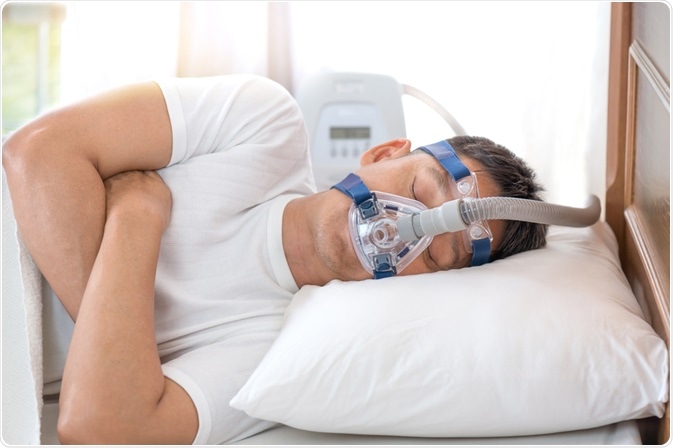Snoring is very common and is caused by the tongue, mouth, throat, or nasal structures vibrating during sleep. If snoring is very heavy, it can cause damage to the upper airway tract, which extends from the nasal cavities to the pharynx and larynx, which can result in swallowing dysfunction and severe sleep apnea.
Treatments for damage can include ventilators, dilators, or surgical interventions.

Image Credit: tommaso79/Shutterstock.com
What Causes Snoring?
Snoring can be caused by several different factors and can sometimes be due or lead to sleep apnea, a condition that causes a person to temporarily stop breathing while they sleep.
Men are more likely to snore than women, with some estimates suggesting 40 percent of men and 20 percent of women in the general population snore.
Common causes of snoring include:
- Being overweight
- Allergies
- Nasal congestion
- Smoking
- Drinking alcohol
- Sleeping on the back.
Respiratory structures relax and narrow during sleep, and as a result, they are more likely to block the passage of air through the nose and mouth and result in snoring. Poor muscle tone in the throat and tongue can also contribute to snoring, as they relax and obstruct the airway during sleep.
Enlarged tonsils and adenoids can also obstruct the airway and cause snoring, along with a long palate (the partition between the oral and nasal cavities) or uvula (a hanging structure made of connective tissue at the back of the throat), which can block the airway during sleep and cause snoring when they come into contact with one another.
What Injuries Can Be Caused by Snoring?
Research has shown that snoring and obstructive sleep apnea can cause neuromuscular injuries in the upper airway tract.
This includes both structural damage, seen in the loss of nerves and muscle mass in the soft palate, and damage at molecular levels.
Once the damage has occurred, the body is less able to properly heal damaged tissue despite the presence of neurotransmitters usually responsible for healing and regenerating neurons being present in the muscle tissue.
This triggers a detrimental cycle in which snoring causes damage to the upper airway tract that the body then cannot repair due to recurrent damage being caused every time a person sleeps, leading to further disruptive sleep problems and possible difficulties swallowing, leading to further snoring and more damage.
Nerve damage caused by snoring has been found to impair thermal sensitivity in the back of the throat in some patients with obstructive sleep apnea, which suggests damage can be local to the oropharynx but not affect other parts of the mouth.
With muscle mass lost in the soft palate, there may also be structural proteins in the muscle fibers of the soft palate that present abnormal organization patterns. These particular proteins are responsible for stabilizing muscle cells and supporting cellular structures, and abnormal organization can impair their function.
Other studies into the damage caused by heavy snoring and sleep apnea have found that mucosal sensory function in the upper airway tract can become impaired in the early stages of the progression of upper airway obstruction during sleep.
It is believed to occur because of neural damage or fluid build-up (edema) caused by the vibrations triggered by snoring.
Other areas experiencing a build-up of fluid include the lamina propria, which is a layer of loose connective tissue in the mucous membranes in the respiratory tract. This damage to the pharyngeal tissues is again caused by the vibrations experienced during heavy snoring.
Long-term use of vibrating tools at work can cause local nerve lesions in the hands, and the case is similar in snoring, where neuronal lesions can appear in the upper airway tract due to the vibrations caused by airway structures rubbing against each other when they obstruct the airways.
These lesions could lead to muscular weakness and impaired reflexes over time in patients with obstructive sleep apnea.
Other damage caused by heavy snoring includes enlarged mucosal glands in the lining of the airways, and disrupted sleep caused by snoring or more serious conditions like obstructive sleep apnea can also contribute to chronic illnesses such as hypertension, stroke, diabetes, heart failure, and coronary heart diseases.
Treatments for Snoring
Several treatments can help manage or stop snoring.
Continuous positive airway pressure (CPAP) is a type of ventilator worn during sleep that applies continuous air pressure and keeps the airways open for people who are unable to breathe without their airway becoming obstructed.

Image Credit: sbw18/Shutterstock.com
Nasal dilators can help those who have a deviated septum (the structure separating the left and right nasal cavities made of cartilage and bone) that can be placed either inside or outside of the nose during sleep. This keeps the nasal passages open and improves airflow by reducing nasal obstructions.
If CPAP and dilators do not overcome problems caused by nasal obstructions, surgical interventions can be used to remove structures or growths such as polyps blocking the airways.
If snoring is being caused by obesity, weight loss and diet control can help to bring snoring under control and limit the damage done to the upper airway tract.
Changing sleeping positions and eliminating any allergens where a patient sleeps can also reduce the inflammation and congestion in the nose that can contribute to snoring. Reducing the intake of alcohol and stopping smoking can also help to alleviate snoring.
Further Reading
Last Updated: Apr 15, 2020